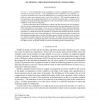Free Online Productivity Tools
i2Speak
i2Symbol
i2OCR
iTex2Img
iWeb2Print
iWeb2Shot
i2Type
iPdf2Split
iPdf2Merge
i2Bopomofo
i2Arabic
i2Style
i2Image
i2PDF
iLatex2Rtf
Sci2ools
113
click to vote
CORR
2007
Springer
2007
Springer
On Minimal Tree Realizations of Linear Codes
A tree decomposition of the coordinates of a code is a mapping from the coordinate set to the set of vertices of a tree. A tree decomposition can be extended to a tree realization, i.e., a cycle-free realization of the code on the underlying tree, by specifying a state space at each edge of the tree, and a local constraint code at each vertex of the tree. The constraint complexity of a tree realization is the maximum dimension of any of its local constraint codes. A measure of the complexity of maximum-likelihood decoding for a code is its treewidth, which is the least constraint complexity of any of its tree realizations. It is known that among all tree realizations of a linear code that extends a given tree decomposition, there exists a unique minimal realization that minimizes the state space dimension at each vertex of the underlying tree. In this paper, we give two new constructions of these minimal realizations. As a by-product of the first construction, a generalization of the ...
Code | CORR 2007 | Education | Tree | Tree Realization |
Related Content
| Added | 13 Dec 2010 |
| Updated | 13 Dec 2010 |
| Type | Journal |
| Year | 2007 |
| Where | CORR |
| Authors | Navin Kashyap |
Comments (0)

